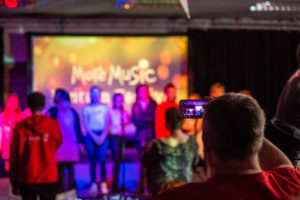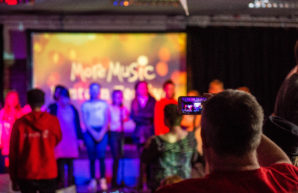Digital Days
Posted by Sandra Wood on 06 April 2020
More Music is having its usual Easter break. But in these unusual times I’ll be doing regular news updates, some digital dispatches, as it were. Loz.
While the country is locked down so many of us find ourselves filling the days digitally.
There has been an extraordinary flowering and outpouring of creative activity online. There are all manner of resources, virtual choirs, free art and daily sonnet readings. A National Theatre stream of “One Man Two Guvnors” peaked at an audience of over 200,000. Even people who profess to dislike Coldplay might be charmed by the Italian Youtube twins playing “Viva La Vida” on violins during quarantine. It’s a good time to remember that cultural life is not just about grand gestures – it’s about shared community, online pub quizzes have their place just as much as streamed opera.
At More Music, we have already been trialling moving activity online – our young leaders group transferred to Zoom, we have been able to run the LYVE vocal ensemble. More than anything for us it is about continuing to nurture the relationships we have with participants and community. It’s about the people and the work, rather than the technology for its own end.
It’s fair to say that the Internet and social media in particular has had a poor reputation in recent years for alleged bad effects on mental health. But for many it is now a life line – and a connection to the wider world outside. Much of this is about sharing cultural experiences, videos of singing from balconies lift the heart when we have needed it.
But what concerns me in these digital days is that we don’t reinforce old barriers to participation in the arts and create new ones. Digital inclusion charity “The Good Things Foundation” estimates that there are 1.7 million households in Britain that “don’t have, and can’t afford, access to the Internet”.
I’ve spent a decade arguing that access to the Internet is now as fundamental as other utilities. Ten years ago that probably seemed hopelessly utopian, even frivolous, to most. Now, the ability to be online is clearly a necessity, particularly when it comes to education. The arts sector needs to address this – we must think about the needs of our audiences and participants as much as our artists.
And it is not just about connection. We must make sure safeguarding is fit for purpose in a radically altered landscape when working with young people and vulnerable adults on line. We need to remember that the government’s vision of “creating education tools which seamlessly integrate the classroom with the kitchen table” assumes a kind of kitchen table that is not the case for many. We need to make sure everyone who is taking part in digital cultural life still has a right to privacy – our personal lives are not the price of creativity.
In these digital days we have an opportunity to open up a world of free resources and to communicate in new ways. That must be open to all and include all.

